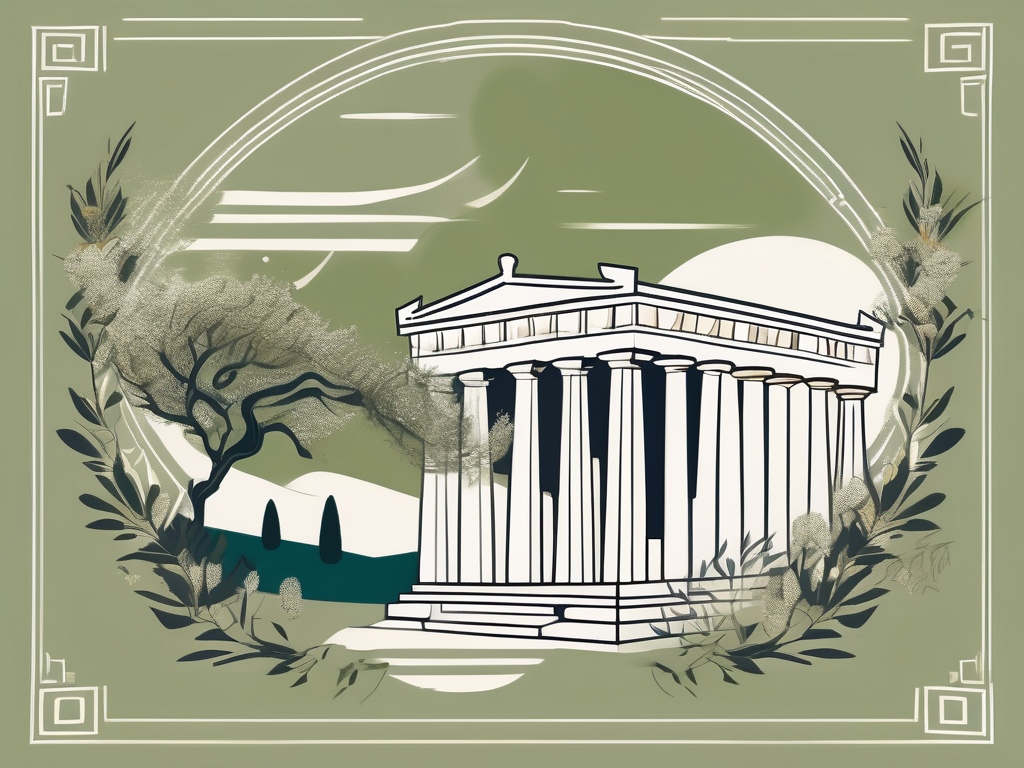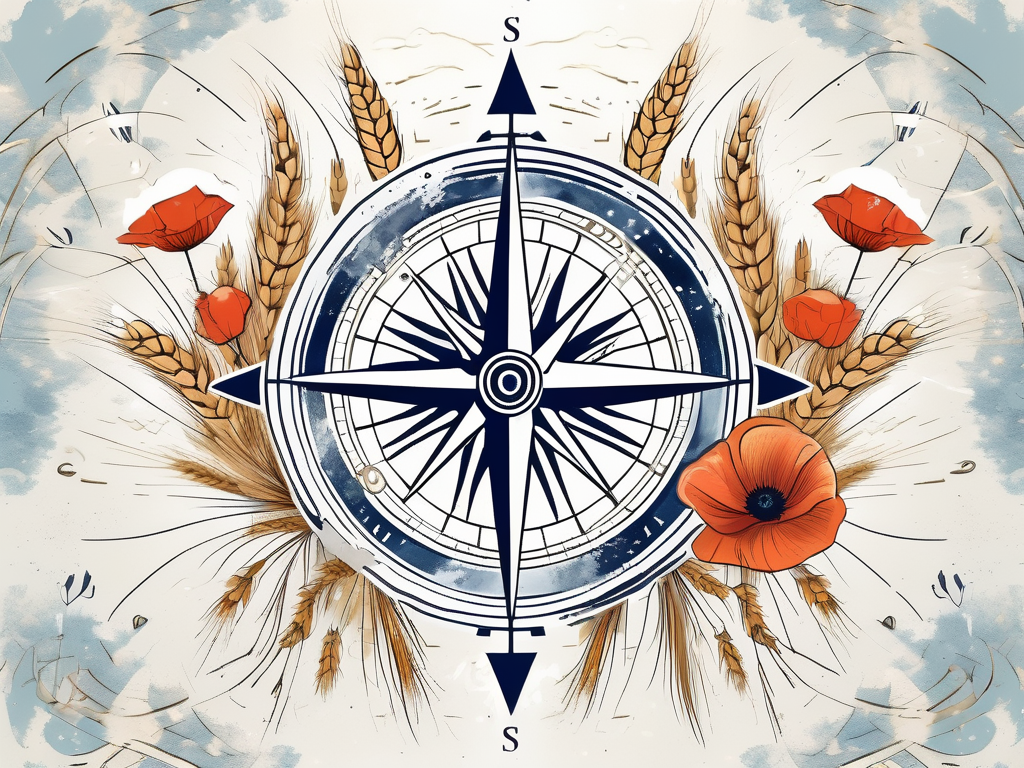Have you ever felt a gentle breeze on your face as you watch the leaves fluttering in the wind? If so, you have experienced the touch of Zephyrus, the Greek god of the West Wind. In Greek mythology, Zephyrus played a significant role, not just as a divine being but also as a symbol of change and transformation. Let’s delve into the captivating world of Zephyrus and uncover the mysteries behind this powerful deity.
Understanding Zephyrus: An Introduction
Before we dive into the role of Zephyrus in Greek mythology, let’s gain a basic understanding of who he is. Zephyrus represents the gentle, warm wind that blows from the west, often associated with the arrival of spring. As a deity, he holds sway over both the natural elements and the human world, making him a fascinating figure to explore.
Zephyrus is not just a mere wind, but a personification of a specific wind direction. The west wind, which Zephyrus embodies, has long been regarded as a symbol of tranquility and calmness. It is a wind that carries with it the promise of new beginnings, as it ushers in the arrival of spring, a season of rebirth and rejuvenation.
As we delve deeper into the realm of Greek mythology, we discover that Zephyrus had a multifaceted role. He was one of the Anemoi, the four wind gods who were the offspring of the Titan Astraeus and the goddess Eos. Zephyrus, alongside his siblings Boreas, Notus, and Eurus, was responsible for controlling and directing the winds across the world.
However, Zephyrus had a unique distinction among his siblings as the god of the West Wind. This designation bestowed upon him a particular significance, making him a force to be reckoned with in the realm of nature and human affairs.
The Role of Zephyrus in Greek Mythology
Within the vast tapestry of Greek mythology, Zephyrus weaves his way through various tales and legends, leaving his mark on both gods and mortals alike. His influence extends beyond the realm of wind and weather, seeping into the very fabric of human existence.
One of the most famous stories involving Zephyrus revolves around his role in the myth of Cupid and Psyche. In this tale, Zephyrus plays a pivotal role in the union of the mortal Psyche and the god of love, Cupid. It is Zephyrus who carries Psyche to Cupid’s palace, ensuring that their love can blossom against all odds.
Another notable myth featuring Zephyrus is the story of Hyacinth. Hyacinth, a beautiful Spartan prince, was beloved by both Zephyrus and the god Apollo. However, tragedy struck when Zephyrus accidentally caused a discus thrown by Apollo to strike Hyacinth, resulting in his untimely death. Zephyrus, consumed with grief, transformed the blood of Hyacinth into a flower, forever immortalizing his memory.
It is clear that Zephyrus’ role in Greek mythology extends far beyond his control over the winds. He is a figure intricately intertwined with the lives of gods and mortals, shaping their destinies and leaving an indelible mark on their stories.
Zephyrus: The God of the West Wind
Zephyrus, as the god of the West Wind, held power over the winds that blew from the west. In ancient Greece, the west wind was associated with tranquility, calmness, and the gentle arrival of spring. It was often seen as a bearer of good fortune, bringing with it the promise of new beginnings.
But Zephyrus’ influence did not stop at the boundaries of the natural world. It extended into the realm of human emotion and behavior as well. It was believed that Zephyrus could influence people’s moods, inspiring feelings of serenity and contentment. The gentle caress of the west wind was seen as a balm for troubled souls, soothing their worries and bringing a sense of inner peace.
Moreover, Zephyrus’ association with the west wind also made him a patron of sailors and travelers. The west wind, with its calm and steady nature, was often favored by those embarking on long journeys across the sea. Sailors would pray to Zephyrus for favorable winds, trusting in his benevolence to guide them safely to their destinations.
As we immerse ourselves in the world of Zephyrus, we begin to unravel the layers of his character and the significance of his role in Greek mythology. From his embodiment of the west wind to his influence on human emotions, Zephyrus emerges as a complex and captivating deity, deserving of our attention and admiration.
The Birth and Parentage of Zephyrus
To fully understand Zephyrus, we must explore his origin and family connections. Zephyrus was born to Astraeus, a titan associated with the stars and the celestial realm, and Eos, the goddess of the dawn. As a result of his divine lineage, Zephyrus inherited immense power and a unique role in the cosmos.
The Anemoi: Siblings of Zephyrus
Zephyrus was part of a remarkable group of siblings known as the Anemoi. Alongside Boreas, the god of the North Wind; Notus, the god of the South Wind; and Eurus, the god of the East Wind, Zephyrus formed an influential quartet that controlled the winds in all directions.
Each sibling had their own distinct attributes and characteristics. Boreas, for example, was associated with winter and the cold northern winds, while Notus represented the scorching heat of summer through the southern winds. Eurus, on the other hand, was connected to the winds that blew from the east, carrying both positive and negative energies.
Zephyrus in Ancient Literature
The mythological tales of Zephyrus found their way into the works of ancient Greek poets and storytellers. Homer and Hesiod, two renowned poets of antiquity, included Zephyrus in their literary creations, ensuring his enduring presence in Greek mythology to this day.
Zephyrus in Homer’s Works
In Homer’s famous epics, “The Iliad” and “The Odyssey,” Zephyrus makes several appearances, each time exuding a sense of calmness and tranquility. His gentle touch is often described as soothing, bringing respite to both gods and mortals. Zephyrus’s presence adds a serene touch amidst the chaos and drama of the ancient tales.
Zephyrus in Hesiod’s Theogony
Hesiod, in his monumental work “Theogony,” provides further insight into the mythological lineage of the gods. Zephyrus appears as a central figure in this epic poem, solidifying his status as one of the major deities of ancient Greece. Through Hesiod’s verses, we gain a deeper understanding of Zephyrus’s role in the creation and maintenance of the cosmos.
Zephyrus and the Seasons
One of the most fascinating aspects of Zephyrus’s mythology lies in his connection to the changing seasons, particularly his association with the arrival of spring. As the west wind, Zephyrus ushers in the transition from the cold darkness of winter to the vibrant rebirth of nature.
Zephyrus and Spring: A Symbolic Connection
Spring, with its blossoming flowers, buzzing bees, and warmer days, is a time of joy and renewal. Zephyrus’s arrival signifies the end of the harsh winter and the beginning of a season filled with hope and life. The gentle touch of his zephyrs breathes life into the sleeping earth, awakening it from its wintry slumber.
The symbolic connection between Zephyrus and spring goes beyond the realm of nature. It represents a metaphorical rebirth—a fresh start that each new season brings, reminding us of the cyclic nature of life itself.
The Love Stories of Zephyrus
As with many gods in Greek mythology, Zephyrus was entangled in a series of love stories that highlight both his romantic nature and the transformative power of love itself. Let’s explore two of the most notable tales that showcase Zephyrus’s amorous escapades.
Zephyrus and Hyacinth: A Tragic Love Story
One of the most tragic love stories associated with Zephyrus revolves around Hyacinth, a handsome and athletic youth beloved by both Zephyrus and the god Apollo. As the tale goes, Zephyrus, consumed by jealousy, caused a strong gust of wind that deflected Apollo’s discus, leading to Hyacinth’s untimely death.
The story of Zephyrus and Hyacinth serves as a reminder of the unpredictable nature of love and the consequences that can arise from unchecked emotions. It also underscores Zephyrus’s vulnerability and his capacity for intense passion.
Zephyrus and Chloris: The Birth of Spring
In contrast to the tragedy of Zephyrus and Hyacinth, the love story between Zephyrus and Chloris is one of beauty and rejuvenation. According to the myth, Zephyrus fell deeply in love with Chloris, the goddess of flowers, and together, they brought forth the season of spring.
Through this story, Zephyrus’s connection to the cycle of nature becomes apparent. His ardent love for Chloris resulted in the blossoming of flowers and the regrowth of plants, symbolizing the rejuvenation and fertility of the earth.
Zephyrus: The Harbinger of Change
Beyond his role in nature and love, Zephyrus also symbolizes change and transformation. In ancient agricultural contexts, Zephyrus represented the wind that brought about the changing seasons, influencing the growth and harvest of crops.
Zephyrus in Agricultural Context
For the ancient Greeks, the arrival of Zephyrus signaled the end of winter and the beginning of agricultural activities. Farmers eagerly awaited his warm breeze, knowing that it heralded the time for planting and tending to their crops.
Zephyrus’s connection to the agricultural cycle goes beyond the physical act of farming. It embodies the broader notion of change and transformation, reminding us that no matter how harsh the winter or unfavorable the circumstances, the winds of change will eventually blow, bringing with them new opportunities and possibilities.
Zephyrus as a Symbol of Transformation
Zephyrus, with his winds of change, serves as a powerful symbol of personal transformation. Just as his arrival brings about a shift in nature, Zephyrus reminds us that change is a natural and inevitable part of life.
In times of uncertainty or stagnation, Zephyrus encourages us to embrace transformation and embrace the winds of change. Like a gentle breeze, he whispers in our ear, reminding us that even the most challenging situations can lead to growth and renewal.
Conclusion
In the enthralling world of Greek mythology, Zephyrus stands tall as the god of the West Wind, a figure of both power and subtlety. From his role in nature and the changing seasons to his love stories and symbolism of transformation, Zephyrus weaves a captivating narrative that continues to resonate with us today.
So the next time you feel a gentle breeze brushing against your cheek or catch a glimpse of leaves rustling in the wind, take a moment to appreciate the touch of Zephyrus—the Greek god of the West Wind, whose mythology holds within it the promise of change, renewal, and the eternal cycle of life.












